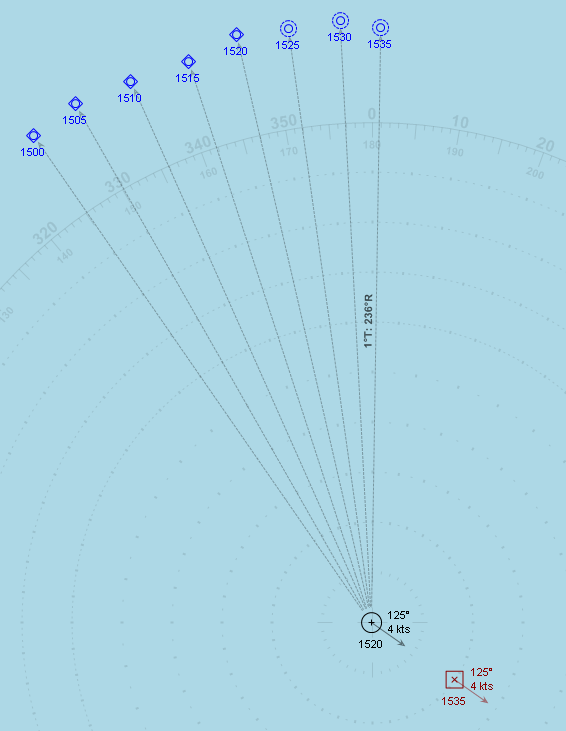
|
|
SUBSIM: The Web's #1 resource for all submarine & naval simulations since 1997
 |
SUBSIM: The Web's #1 resource for all submarine & naval simulations since 1997 |
|
|
 07-29-09, 08:18 PM
07-29-09, 08:18 PM
|
#1 |
|
Helmsman
 Join Date: May 2009
Location: Germany
Posts: 102
Downloads: 174
Uploads: 4
|
two questions:
a) when triangulating while moving: Would I take a map screenshot from my last position I had while moving, make this the mobo center, predict bearings, change course for 20 minutes, then take another bearing, make another screenshot (I marked my previous position with a nice fat x), load that new screenshot into mobo and draw the new bearing? b) would this be the same as a leg change? |

|
 07-29-09, 09:26 PM
07-29-09, 09:26 PM
|
#2 |
|
Ace of the Deep
 Join Date: Jun 2005
Location: Palm Beach, Florida
Posts: 1,243
Downloads: 53
Uploads: 8
|
 I think you could make it a little easier on yourself like this... I think you could make it a little easier on yourself like this...Let's assume you have the same general TMA track as before. Only this time let's assume the current time is 1520 and the last 3 bearings plotted below are predictions in the future. I've marked the known bearings with diamonds, and circled the predictions. At 1520 I order the sub to cut the engines and hold position, maybe even order a little reverse engines to bring us to a halt faster. Notice my predicted bearing for time 1535 is 1°T:236°R  I plotted a contact right on top of my ownship symbol in the center of the MoBo and set the time for the contact as 1520. Then I used the unit advance feature to move the contact ahead to where I would've been at time 1535 had I not remained stationary. Have you used the unit advance feature before? ...it was a tool I added after I wrote the manual and is documented only in the MoBo forum. Anyway, I know the predicted bearing at time 1535 is 1°T so I can plot that on the contact. And now I sit motionless and wait until 1535.  At 1535 the sonar man reports target bearing 247°R. So I plot the bearing from my stationary location (center of MoBo) and can easily triangulate on the 9000yd distance.  It's also possible to change your course and move to another location for the second reading. I just think it's easier to conceptualize if I tell you to stop the sub. Last edited by XLjedi; 07-29-09 at 10:28 PM. |

|
 07-29-09, 10:40 PM
07-29-09, 10:40 PM
|
#3 |
|
Ace of the Deep
 Join Date: Jun 2005
Location: Palm Beach, Florida
Posts: 1,243
Downloads: 53
Uploads: 8
|
Hmm... I see that I sorta deleted the thread that talked about the "Unit Advance" tool when I moved all the files over to the downloads area.
Maybe I should write an addendum to the manual to document some of the newer gadgets that have been added since the initial release of version 1.0? |

|
 07-30-09, 10:41 AM
07-30-09, 10:41 AM
|
#4 |
|
Helmsman
 Join Date: May 2009
Location: Germany
Posts: 102
Downloads: 174
Uploads: 4
|
Now this is elegant! I used the advance tool before. But not for this reason, rather for tracking several radio contacts.
Thanks a lot! |

|
 07-30-09, 08:07 PM
07-30-09, 08:07 PM
|
#5 |
|
Ace of the Deep
 Join Date: Jun 2005
Location: Palm Beach, Florida
Posts: 1,243
Downloads: 53
Uploads: 8
|
This is just one approach that happened to come to mind, it's not like I have some hardfast rules that I follow...
There are lots of other things you can do or dream up to analyze the target motion and solve for the target position/vector data. For instance, you could take the example above and add two or three more predictions for a new bearing at 1550. Then use the advance feature again and do another triangulation at 1550 for a second position fix. Then you'd have two real triangulated positions with time elapsed as a given. A line between those two positions gives you true course. Distance between the points along with the elapsed time allows you to calculate the target true speed (TSD calcs in MoBo are simple). You can do all this from your stationary location once you have a TMA track that you can use to predict future target bearings. Good questions and happy hunting. 
|

|
 06-01-10, 06:39 PM
06-01-10, 06:39 PM
|
#6 |
|
Sea Lord
 Join Date: Feb 2005
Location: Shreveport, Louisiana
Posts: 1,956
Downloads: 13
Uploads: 0
|
I really wish you would implement the least squared TMA into your app if possible. Would help things a bit
|

|
|
|
